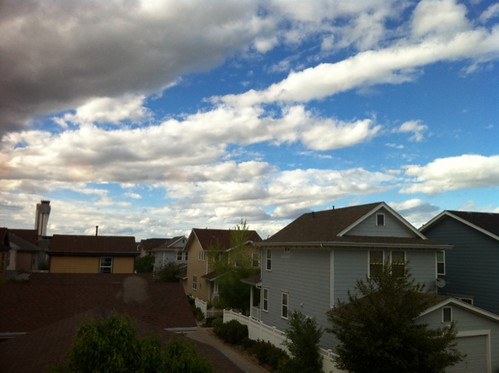Much ink is being spilled today over Stephen Hawking’s comment in an interview with The Guardian that “I regard the brain as a computer which will stop working when its components fail. There is no heaven or afterlife for broken down computers; that is a fairy story for people afraid of the dark.”
So… is he right?
As a fairly scientifically-minded person not predisposed to take things on faith, this is a question I’ve wrestled with for a long time. Actually, I can be more specific than that. It’s a question I’ve wrestled with since Mrs. Duetsch’s World History I class, my freshman year in high school, going on 16 years ago. Mind you, I went to public school, this was a history class, and Mrs. Duetsch wasn’t teaching religion (or its absence). Not at all. She was straightforwardly teaching the early part of the history of human civilization — the ancient Mesopotamians, the ancient Egyptians, etc. And of course, as part of learning the histories of those ancient societies, you learn about their religious beliefs.
Up until that point, I knew almost nothing about religions other than a handful of flavors of Christianity, and (vaguely) Judaism. I knew, of course, that other religions existed, and had existed throughout the history of humanity, but I’d never really been exposed to them in any level of detail. And now suddenly, I started learning about all these strange, quirky, oddball beliefs that these ancient peoples had — most notably about the afterlife, and what it takes to get there. And I thought to myself, “Isn’t that funny? Isn’t that odd?” And: “They sure did go through a lot of trouble to convince themselves of this elaborate afterlife they believed in, and to set up all sorts of rituals about how you get there.”
And then came the critical follow-up. I thought, “Wait a minute. Wouldn’t they think the same thing about us? And why shouldn’t they?” Is it really so much less quirky, less odd, to believe that Jesus Christ died on a cross to redeem mankind and that, thanks to Him, we go to Heaven if we live virtuous lives (and/or repent for our sins)? Or that there’s a Messiah who hasn’t yet come, but that He will someday? On what basis should I be inclined to suspect that those objectively silly-sounding notions are any more likely to be true than the silly-sounding beliefs of these various ancient peoples?
Most importantly, I thought, why doesn’t my insight* about the afterlife apply equally to us? Isn’t the simplest explanation for all these competing views about the afterlife simply that we all really, really want to believe there’s an afterlife? Isn’t the infinite capacity of human invention, motivated by an intense desire to believe that we don’t simply cease to exist when we die, by far the most likely explanation for all the varied beliefs about the afterlife? In the absence of a compelling reason to suspect that one set of beliefs is more right than the others, isn’t the simplest answer that they’re all wrong, that there is no afterlife, that we mortals just invented the concept entirely out of whole cloth?
Basically, unbeknownst to Mrs. Duetsch or anyone else in class, World History I made me an agnostic. And that’s where I’ve been ever since.
I don’t know where or when I first heard the Voltaire quote, “If God did not exist, it would be necessary to invent him,” but that was basically the insight I arrived at independently, except substitute “the Afterlife” for “God.” (Whether there’s some higher organizing power in the Universe that could reasonably be called “God” is, for me, a separate question.) And I truly believe that. If there were no afterlife, we humans would surely believe that there is one anyway. (Well, most of us would.) The motivations to invent the idea are too obvious, too utterly compelling: first and foremost the overwhelming reluctance to believe that everything simply ends when we die (and, perhaps even more powerfully, when those we love die), but also the desire to create incentives to live a virtuous life, even when nobody’s watching. We want to believe that the unfairly maligned will have an eternal reward, and that those who escape justice in this world will find it in the next. Of course we want to believe that. Whether it’s true or not, we would want to believe it.
But does that prove it’s not true? Not necessarily. Occam’s razor, in my view, suggests that there is no afterlife. I might even say strongly suggests. But Occam’s razor isn’t a law; it doesn’t posit that the simplest explanation is always right. Just that it tends to be right. So it’s certainly still possible that, although we would believe in Heaven even if it were a “fairy story,” it just so happens that it’s not a “fairy story”: it actually exists, conveniently enough! That’s possible. I can’t disprove that, any more than I can prove it. And so I remain agnostic on the question, and continue to cross my fingers and hope that Hawking is wrong — and continue to say things like “Rest in Peace,” and to reference Heaven when people die, earnestly hoping in my heart that those words aren’t empty — even as a substantial portion of me suspects that Hawking is probably right.
(This has been your Living Room Times Religion/Philosophy Corner entry for the day. We now return you to your regularly scheduling political flame wars, already in progress.)
*I use the term “my insight” very loosely. I realize that this is by no means an earth-shattering idea. It’s something that countless others have thought of, and have articulated far better than me. I only say “my insight” because, at age 13 or 14, I came to this idea independently, not triggered by reading any great thinkers on the matter, nor by hearing a pithy quote like Voltaire’s “it would be necessary to invent him” or Marx’s “opiate of the masses,” but rather simply by learning about ancient religions and then making some logical leaps from there. And yet in the years since, despite reading all sorts of interesting and insightful commentaries on the matter, and despite (I hope!) maturing intellectually, I’ve never been able to really meaningfully expand on that initial “insight.” I still don’t feel I have a solid answer to the question, and I doubt I ever will.








